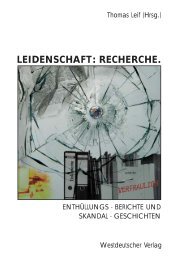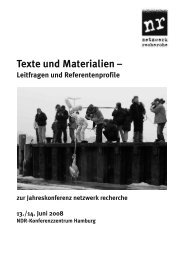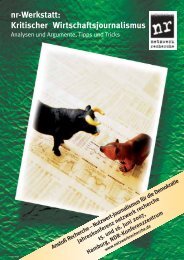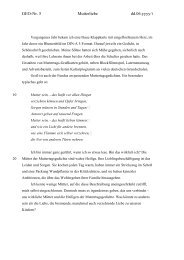Kurzbiografien der Referenten und ihre Themen [PDF] - Netzwerk ...
Kurzbiografien der Referenten und ihre Themen [PDF] - Netzwerk ...
Kurzbiografien der Referenten und ihre Themen [PDF] - Netzwerk ...
Erfolgreiche ePaper selbst erstellen
Machen Sie aus Ihren PDF Publikationen ein blätterbares Flipbook mit unserer einzigartigen Google optimierten e-Paper Software.
Sa, 11 Uhr<br />
So, 14.30 Uhr<br />
Craig Silverman<br />
How to prevent factual errors<br />
Journalistic error and correction: The rise of<br />
external Fact-Checking<br />
Craig Silverman is an award-winning journalist and<br />
author. He is associate editor of PBS MediaShift,<br />
and a columnist for Columbia Journalism Review.<br />
His writing has appeared in The New York Times,<br />
Globe And Mail, The Gazette (Montreal), Toronto<br />
Star, and Harvard’s Nieman Reports, among other<br />
publications. He is the author of Regret the Error, which won<br />
the Arthur Rowse Award for Press Criticism, and the foun<strong>der</strong><br />
of www.RegretTheError.com, a website that reports on media<br />
errors and accuracy.<br />
Thema<br />
Lecture: Errors have been appearing in the press since the<br />
earliest days of journalism. So too have corrections. But why<br />
do these errors occur, and how are news organizations working<br />
to prevent and correct them, especially in the Internet<br />
age? This presentation examines the root causes of journalistic<br />
error, and the history of the correction. It investigates how<br />
the correction must evolve in or<strong>der</strong> to serve a media environment<br />
where mistakes spread aro<strong>und</strong> the world in seconds,<br />
and fact checking has become a passion and practice for<br />
groups and individuals outside of the press. Finally, it examines<br />
some of the tools and technologies emerging to help correct<br />
errors.<br />
Workshop: Everybody makes mistakes—but many common<br />
journalistic errors are preventable. This workshop provides a<br />
hands-on guide to avoiding the most common errors. Discover<br />
how errors occur in journalism, and develop tools and<br />
processes to prevent them. Missing it would be a tragic mistake<br />
for any writer or editor.<br />
Sa, 11 Uhr<br />
Mathew D. Rose<br />
Checken statt abschreiben: Von <strong>der</strong> Behauptung<br />
zur Tatsache<br />
Mathew D. Rose, Jahrgang 1954, ist ein amerikanischstämmiger<br />
Journalist in Deutschland. Rose studierte an <strong>der</strong> University<br />
of California at Berkeley mo<strong>der</strong>ne Geschichte <strong>und</strong> in London<br />
Opernregie. Er arbeitet heute als investigativer Journalist<br />
<strong>und</strong> konzentriert sich seit Mitte <strong>der</strong> 1990er Jahre beson<strong>der</strong>s<br />
auf White Collar Crime (Politik). Nach etlichen Jahren <strong>der</strong> Spezialisierung<br />
auf Korruption <strong>und</strong> Filz in Berlin, war er an <strong>der</strong><br />
Untersuchung des Berliner Bankenskandals beteiligt. Danach<br />
wechselte er seinen Schwerpunkt auf b<strong>und</strong>espolitische <strong>und</strong><br />
politikfreie organisierte Wirtschaftskriminalität.<br />
Thema<br />
Arbeitsintensiv, eine Materialschlacht, teuer – egal wie man<br />
es beschreiben will, investigativer Journalismus ist harte,<br />
langwierige Arbeit. Er setzt sehr viel mehr als trockene Recherchen<br />
im Büro voraus. In <strong>der</strong> Recherchephase verlangt es<br />
Leidenschaft <strong>und</strong> eine Überzeugungskraft, um Menschen<br />
zum Mitmachen, das sogar mit beträchtlichen Risiken verb<strong>und</strong>en<br />
ist, zu motivieren. Nach <strong>der</strong> Recherche muss man genau<br />
all diese Qualitäten abstreifen, um größter Kritiker <strong>und</strong><br />
Zweifler <strong>der</strong> eigenen Ergebnisse zu werden. Am Schluss ist es<br />
wichtig, einen Mittelweg zu finden, um eine sachliche, verständliche<br />
Geschichte zu schreiben. Lei<strong>der</strong> ein aussterbendes<br />
Fach, es ist eine Schule für das Leben.<br />
In diesem Workshop geht es um die zweite Phase. Wie man<br />
durch die eigene Recherche geht <strong>und</strong> die Spreu vom Weizen<br />
trennt. Es geht eben auch darum, das Konstrukt einer gr<strong>und</strong>legenden<br />
Skepsis zu legen, das ein ganzes Projekt durchzieht.<br />
Sa, 13.15 Uhr<br />
Sa, 16.30 Uhr<br />
Sarah Smith<br />
What can we learn from the fact checking disasters<br />
of the past?<br />
How to read like a fact checker<br />
Current Position, February 2005 to present: Managing<br />
Editor, The New York Times Magazine. Responsible<br />
for overseeing all aspects of publishing a<br />
national weekly magazine. Managing A issue closing<br />
and long term scheduling. Balancing an approximately<br />
$7 million budget. Negotiating contracts<br />
and approving payments. Evaluating and hiring staff and<br />
freelancers. Scheduling vacations and leaves. Approving<br />
freelance and staff expenses, including travel. Reviewing advertising<br />
for suitability and content conflict. Proofreading closing<br />
pages. Editing the letters column and responding to rea<strong>der</strong>s.<br />
Other Work Experience: August 2002 to February 2005: Head<br />
of Research, The New York Times Magazine. Responsible for<br />
hiring, training, and supervising fact checkers. Devised and<br />
implemented a new fact checking process for the magazine.<br />
Spring 2001 to Summer 2002: Writer, “The Fact Checker’s Bible”<br />
(Anchor, August 2004). This first published guide to fact<br />
checking received favorable reviews in the Wall St. Journal,<br />
the San Francisco Chronicle, Publisher’s Weekly, the Library<br />
Journal, the American Society of Journalists and Authors<br />
Monthly, and other publications. Summer 1994 to Spring<br />
2001 (with breaks for freelance projects): Fact Checker, The<br />
New Yorker Magazine. In addition to checking complicated<br />
pieces in the magazine, assessed manuscript submissions for<br />
the fiction department. Winter to Summer 2000: Writer, The<br />
National Committee on Foreign Relations. Wrote content for a<br />
web site and CD-ROM chronicling international efforts in<br />
landmine clearance. Fall 1998 to Spring 1999: Fact Checker,<br />
Jeff Toobin’s “A Vast Conspiracy” (Random, 2000) and Lillian<br />
Ross’s “Here But Not Here” (Random, 1998). Fall 1998 to<br />
Spring 1999: Writer and Researcher, Richard Avedon’s “The<br />
Sixties” (Random, 1999). Researched and wrote biographical<br />
paragraphs to accompany Avedon’s portraits of political and<br />
artistic figures famous in the 1960s. Compiled information<br />
from scratch, finding and interviewing subjects when possible.<br />
Education: 1993 to 1994: Columbia University, MA in English<br />
and Comp. Lit.; 1987 to 1990: Oxford University, BA/MA in<br />
3


![Kurzbiografien der Referenten und ihre Themen [PDF] - Netzwerk ...](https://img.yumpu.com/21354886/3/500x640/kurzbiografien-der-referenten-und-ihre-themen-pdf-netzwerk-.jpg)
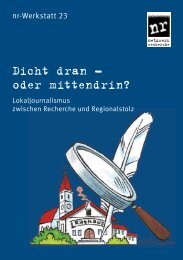
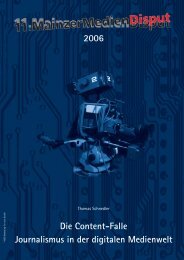
![Rede Frank A. Meyer [PDF] - Netzwerk Recherche](https://img.yumpu.com/21238543/1/184x260/rede-frank-a-meyer-pdf-netzwerk-recherche.jpg?quality=85)
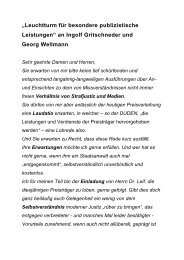
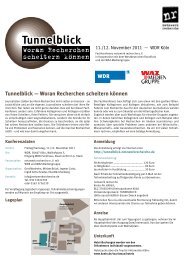
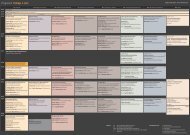
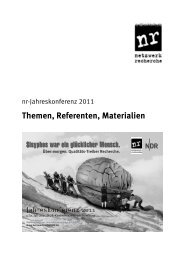
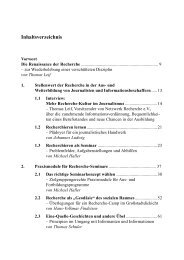
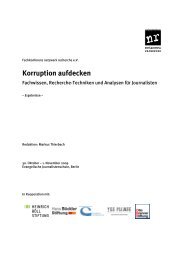
![Die stille Macht [Text] (381 S., 2.142 - Netzwerk Recherche](https://img.yumpu.com/7467581/1/184x260/die-stille-macht-text-381-s-2142-netzwerk-recherche.jpg?quality=85)
